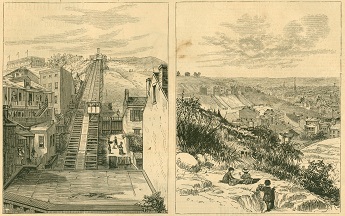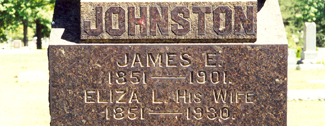
|
Judge
James E. Johnston |
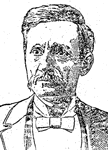 |
Judge Johnston |
Judge James E. Johnston was born on Feb. 1, 1851 at Brownsville, Licking County, OH, the eldest son of Seth R. and Isabel (Minor) Johnston.
He was one of the earliest lawyers and judges in our family.
In October 1878, when he was 27 years of age, James was joined in wedlock with 30-year-old Eliza "Lyda" Brown (1848-1930), a native of Licking County.
They produced two children -- Brandt C. Johnston and Vera Johnston.
As a boy, James moved with his parents to Glenford, Perry County, OH. He worked at his father's general store for many years.
Tragically, in 1874 when James was age 23, his mother died violently when thrown from a buggy during an accident. That same year, he began to "read law" with W.E. Finck to prepare for a career as a lawyer.
James entered the Law School of Cincinnati College, now known as the University of Cincinnati College of Law. In 1878, James graduated with high honors. He then went to Shawnee, Perry County, the home of his uncle Daniel L. Minor, to launch his practice. He only stayed one year at Shawnee, and then moved to New Lexington. More than a decade later, in 1889, he signed his name as a witness on paperwork that his uncle Daniel had filed to receive a Civil War veterans pension.
|
|
|
Views of Cincinnati at the time James studied there. Frank Leslie's Illustrated Newspaper, June 17, 1876. |
 |
New Lexington Tribune, 1896 |
James was picky about the spelling of his name, and disliked it when people misspelled it "Johnson." He once ran a notice in the local newspapers, requesting them to spell the name correctly, with the "t," probably because he did not want to be confused with the president of the local Perry County Bank, J.J. Johnson.
James is featured with a short biography in the 1883 book by W.H. Beers Co., History of Fairfield and Perry Counties, Ohio. At the time, he was an attorney and a notary public with the firm of Johnston & Bryan.
Summarizing his career, the New Lexington Herald once said:
He served the people as prosecuting attorney three years; and upon the death of Judge J.G. Huffman, Gov. Bushnell appointed him to fill the interim in that high office, between Judge Huffman's death and the succeeding election. He filled a number of minor offices, and was faithful and true to every public trust. Judge Johnston was a genial, whole-souled gentleman, and counted his friends by the score. He was a man of sterling integrity, and true as steel to a friend.
 |
New Lexington Tribune |
James' appointment as a judge in February 1896 met with praise. The New Lexington Tribune, a Republican paper, said the move "is received with great satisfaction by the members of the Logan bar. They feel that Governor Bushnell made a happy solution of a difficult situation." The Zanesville Press said that "The new judge is very popular and his appointment is favorably received not only in the county, but district." To accept the judgeship, he resigned as a member of the Perry County Election Board and the New Lexington Town Council.
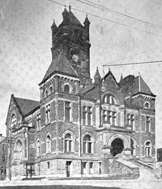 |
Perry County Courthouse |
His chambers were in the Perry County Courthouse in New Lexington, seen here circa 1910 in a rare old postcard photograph.
After one particular week of presiding over jury trials, James was honored when the petit jury, which had been dismissed, waited for him outside his chambers, and invited him to go have their photo taken together. One of the jurors gave remarks about their appreciation of his abilities, and when James tried to stand and respond, he was overwhelmed with emotion. Said the Tribune, "[It] was evident to all that the Judge had been touched on a tender chord. He said that this event would be remembered as one of the brightest moments of his life, and that he would labor incessantly to merit the confidence the jury had expressed in him."
Seen here is a rare old postcard photograph view of Main Street in New Lexington, looking north from Town Hall.
The judicial bench must have agreed with James financially. In July 1896, he purchased "a fine horse and buggy." Socially, that summer, he and Lyda entertained his father and his half-sister Ada as house guests, visiting from their home in Glenford. He also went fishing with a friend to Buckeye Lake. Lyda also served that summer as secretary of the Ladies Reading Circle, and hosted meetings at their home.
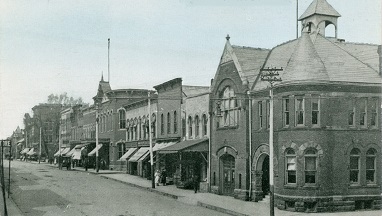 |
New Lexington's Main Street |
 |
News story, 1896 |
During his short tenure as judge, James made appointments for the positions of constable, court constables and assistants to the prosecuting attorney. He also held court one week in nearby Hocking County.
Later that year, in October's political campaign season, he declined to run for election for the judgeship. A newspaper said the decision was made "by the advice of his physician... This will explain to his many friends who have expected to meet him the reason of his failure to do so."
 |
Obituary, 1901 |
After the 1896 election, though he was not officially running, his name remained on the ballot, as the only Republican out of 4 candidates. He ultimately lost by 220 votes, or 48.7 percent of the ballot. When he was succeeded by Judge Wright, the Tribune praised his work, saying "during the short time that he has worn judicial honors [he] was energetic in dispatching the business of the court, upright in his manner, fair and impartial in his decisions...." The rival Herald, a Democratic paper, said "we believe he has endeavored to be fair and impartial in his Judicial rulings, and retires with the good wishes of all."
James suffered from a very bad case of tuberculosis, and his retirement from the bench began a long decline in his health. Sadly, on June 19, 1901, he passed away in his home. The news made front-page headlines, and mourners came from all over the area to pay their last respects. James' funeral was said to be one of the largest ones seen in New Lexington in many years.
Four years later, son Brandt went out west to try to recuperate from poor health. He returned home in the fall of 1905, but went downhill quickly, and died on Oct. 24. Among the out of town mourners were the deceased's aunt and uncle, Charles and Carrie (Johnston) Hunt of Glenford. He was buried beside his father in the New Lexington Cemetery.
|
|
|
The Johnstons' grave
marker, New Lexington Cemetery |
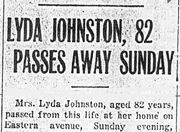 |
Obituary, 1930 |
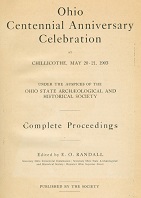 |
Ohio Centennial book, 1903 |
Daughter Vera only survived her brother by five years. She was burdened with pulmonary tuberculosis, and suffered for two years. Unable to rally, she died on April 4, 1910, at the age of 25. The obituary in the Herald said she "was of a cheerful and kindly disposition and enjoyed the sincere friendship of a very large circle of friends and will be sadly missed by those who enjoyed her friendship." She was laid to rest beside her father and brother.
Now alone without her husband or children, Lyda spent her remaining years at her old home on Eastern Avenue in New Lexington, remaining a "devout and consistent member of the Presbyterian church."
In February 1930, she died of old age. She is buried with her husband, son and daughter.
James is cited in the 1903 book Ohio Centennial Anniversary Celebration, edited by E.O. Randall and published under the auspices of the Ohio State Archaeological and Historical Society. His name appears in the book as part of Moses M. Granger's chapter entitled "The Ohio Judiciary."
Copyright © 2000, 2002, 2006, 2012, 2018 Mark A. Miner |
Sketch of Cincinnati from Frank Leslie's Illustrated Newspaper (June 17, 1876) |
